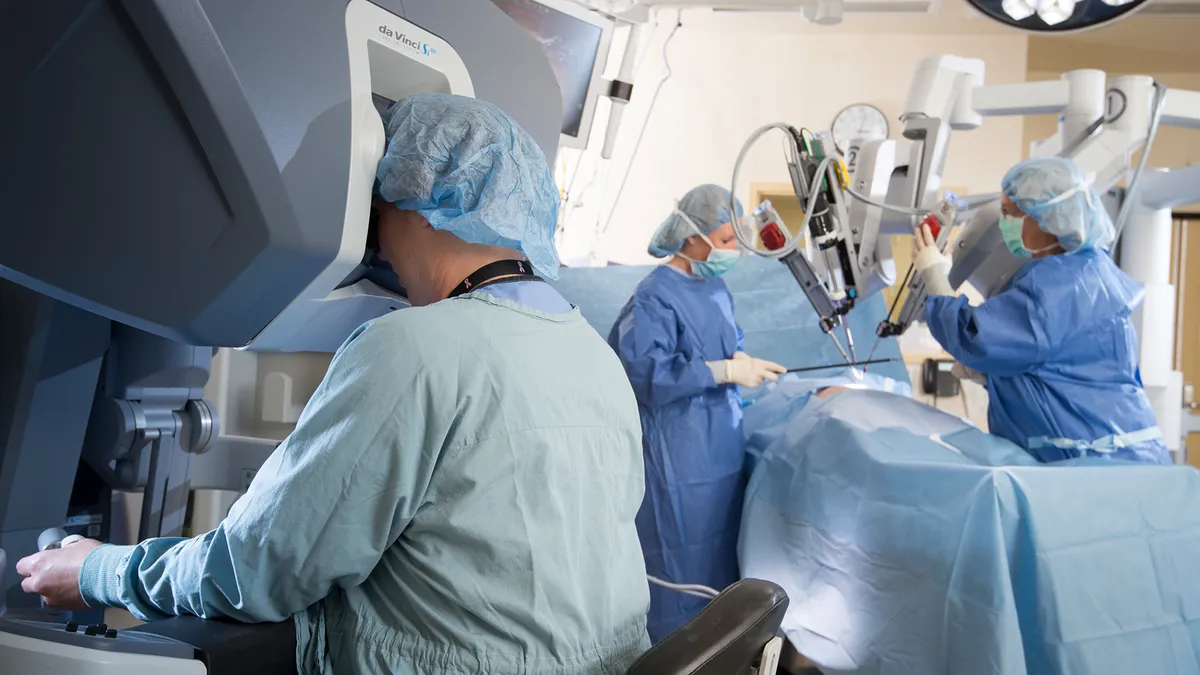Robot-assisted surgery volumes fell sharply in the first half of 2020 as the COVID-19 crisis forced hospitals around the globe to forgo elective procedures.
Arguably the clearest example comes from market leader Intuitive Surgical, which reported in second quarter results last week da Vinci utilization was down 27% year over year, and the company expects hospitals will look to fill that excess capacity before buying additional systems. Robot-assisted procedures rose in May and June after a weak April, but July was shaping up to be a softer month as hospitals in states such as Texas, Florida and California saw a resurgence of COVID-19 cases, the company noted.
"We expect the recovery tail of surgery will be a long one, likely to last many quarters," CEO Gary Guthart said.
Surgeons who perform robot-assisted operations are expecting a gradual recovery in the second half of the year, according to survey data from two investment firms. But the outlook for new robot system placements in hospitals is less optimistic, due to freezes in capital equipment budgets this year as priorities shifted to fighting the pandemic.
A mid-July J.P. Morgan survey of 25 senior-level surgeons involved in purchasing decisions for robotic devices found participants seeing rising numbers of weekly procedures performed at their practices on da Vinci systems, with respondents anticipating steady ongoing increases.
Eight surgeons said their practices performed more than 25 da Vinci procedures weekly in early July, up from four who saw those levels in late May. Fourteen surgeons expected to perform more than 25 da Vinci procedures a week by early November.
Adding to signals of a rebound, respondents indicated every robotic surgery procedure category except head and neck was already more than 50% booked for July through September, led by gynecology and urology tracking at more than 65% capacity. Robotic procedure capacity use continued to improve in the October to December timeframe, with gynecology and urology more than 75% booked.
In a separate report that echoed J.P. Morgan's findings, Stifel analysts on July 19 shared results from a survey of more than 100 surgeons by a European consultant indicating robotic procedure volumes could see a 65% rebound in the second half from second-quarter trough levels.
"While the COVID-19 pandemic has been clearly disruptive, the impact will not linger, and longer-term robotic adoption trends appear encouraging," the Stifel report said. Tempering the outlook are concerns about potential operating room and ICU capacity constraints due to temporary COVID-19-driven infrastructure changes, limited availability of supporting staff, and disruptions in testing and screening protocols.
Both J.P. Morgan and Stifel said their survey data pointed to hospitals delaying rather than canceling da Vinci orders. "While postponed placements could unfavorably affect da Vinci procedure growth, we were encouraged that no survey respondent indicated robotic purchase plans have been canceled," the Stifel analysts said.
For its part, Intuitive Surgical told investors it's taking steps to reduce costs for customers using its systems, launching more durable, extended-use instruments and planning price cuts on other instruments in the fourth quarter, while also offering more flexible financing for placements.
Jeff Jonas, a portfolio manager with Gabelli Funds who follows the healthcare sector, noted that non-emergency elective surgeries are indeed trending up, having started again in May and June and continued in July, even with new outbreaks of the coronavirus in southern and western U.S. states.
Intuitive, which ended the second quarter with $6.1 billion in cash on its balance sheet, can afford to be accommodating to its hospital customers, Jonas noted. "If they have to sacrifice a bit for a couple of quarters to keep their customers happy and the pipeline going, they can do it," he said.
J.P. Morgan said a handful of respondents in its survey indicated Intuitive's flexible financing arrangements had helped them grow their robotic programs, but only some expected the plan to drive purchases in the balance of 2020 or in 2021.
For Intuitive, the pandemic has also provided a silver lining in the form of delayed competition for its da Vinci platform from would-be rivals Medtronic and Johnson & Johnson, both of which are investing heavily in robotic surgery offerings but have pushed back development timelines for their projects in recent months.
Medtronic in May said the COVID-19 pandemic was limiting its engineers' access to the hardware for its soft tissue system, named Hugo, as they work remotely. External sites involved in testing have also been disrupted, Medtronic said. A Medtronic spokesperson told MedTech Dive on Monday that the situation has improved since May and its teams now "have access to the robot or to the sub-assemblies they are responsible for," but Medtronic said it had no new updates to share regarding the overall program.
J&J in mid-July said it now expects to enter first-in-human clinical trials for its robotic platform for general surgery in the second half of 2022. That delay is significant, and may push a possible launch of the product into late 2024 or 2025, by the estimation of Gabelli's Jonas.
Still, J.P. Morgan analysts said surgeons in its survey highlighted potential advantages to new robotic systems, including access to a larger network of representatives, technology improvements such as portability and ease of set-up, and pricing.















